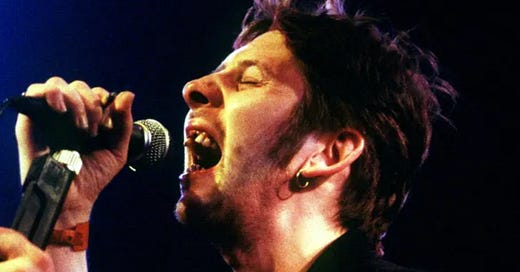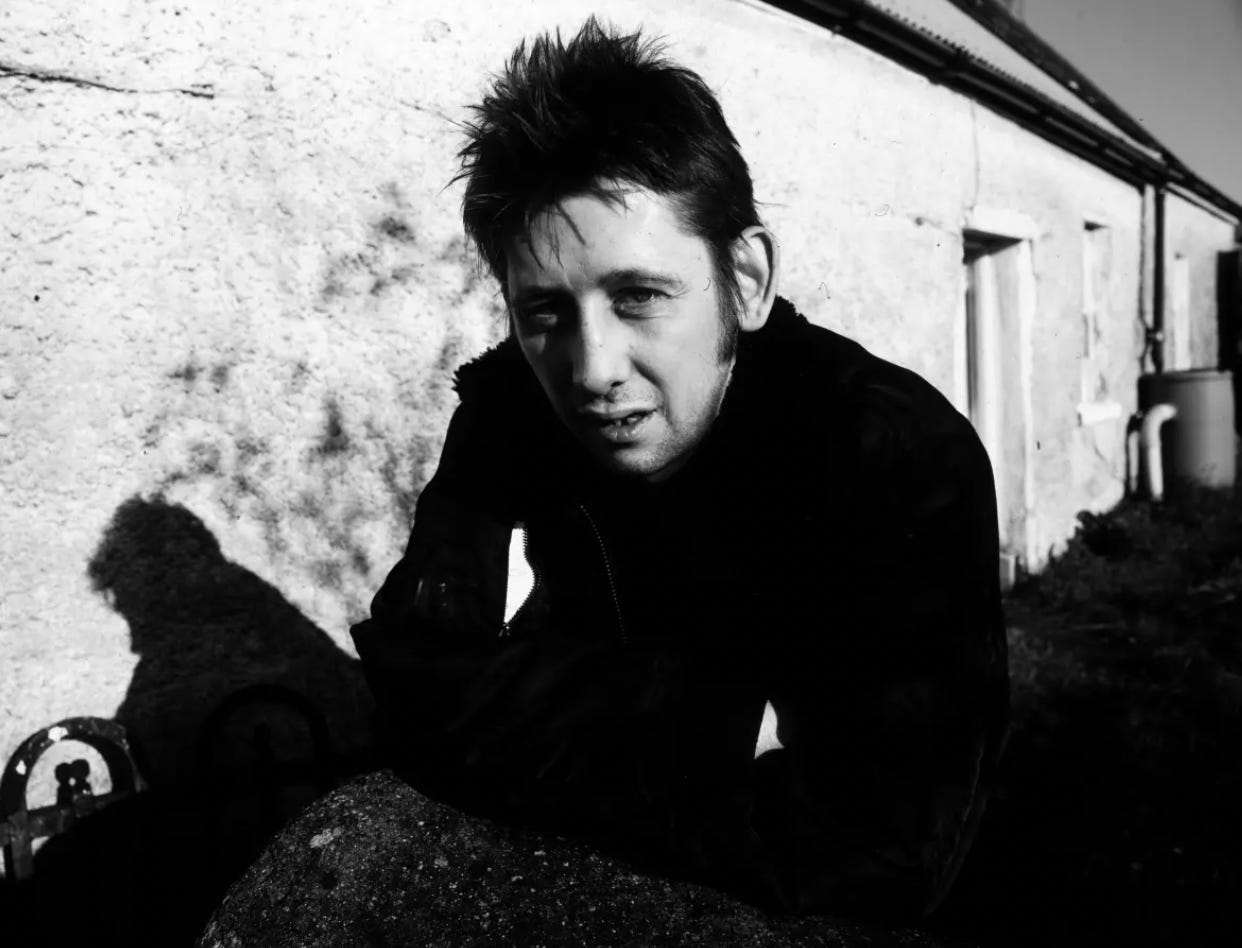A few minutes after I published Thursday’s newsletter about Nick Cave, I found out that my dear friend Shane MacGowan had passed away. One of the few subjects Nick always talked to me about was Shane…I worked with both of them at the same time and they were old friends who were in need of a catch up and I always had updated information.
Shane MacGowan was the greatest lyricist/songwriter of his generation. He sits in the pantheon of Irish scribes alongside John Banim, James Joyce, William Butler Yeats, Ronnie Drew, Tommy Makem, and Van Morrison. I worked with Shane for five years, and remained friends forever after; throughout, Shane was one of the most generous, kind and thoughtful people I met on my music travails…which I was not expecting given his reputation as crazed, larger-than-life lunatic. Not a moment ever went by when I was with him that I did not have an understanding of who I was with: the one and only Shane fucking MacGowan. The voice of the Pogues, a band that sounded and acted and played like no other, with Shane’s poetry and musical vision at the forefront…the “romantically dangerous” drunken, drug addled rockstar that, fueled by the press, gave him an almost fictional veneer. Who gets to work and hang with such a legendary human? He bridged the lands of ancient Ireland and the modern world, of folk music and story-telling traditions, of ancient bards and beat poets…a fearless social commentator: doing it all with a punk aesthetic that set the world on fire, riotously allowing hundreds of thousands of fans to make this inheritance their own.
It was only after getting into the Pogues that I discovered Shane’s deep involvement with the original English punk rock scene. He was a poster child of the movement, after a photo hit magazine covers of Shane with a bloodied ear that he got pogo-ing at a Clash gig in London. He self-published one of the first punk zines in 1976—Bondage—that is available on-line for viewing—talking about the Sex Pistols, The Jam and Eater (the latter of which he wrote: “They like The Velvets (The Velvet Underground)…which means there’s some hope for Modern Youth). And of course, he formed his own punk band, The Nipple Erectors who became the Nips, releasing the classic single All the Time in the World.
Given that every paper right now is telling the story of Shane MacGowan, and that I have written about him before in this newsletter, let me celebrate my old friend today by talking about the last record we worked on together, the criminally under-appreciated Crock of Gold (which I have been listening to a lot over the past few days). In my mind, The Crock of Gold was Shane’s most solid, fully-realized album since Rum, Sodomy and the Lash (one could argue If I Should Fall From The Grace of God…and happy to have that argument….over some Irish Whisky). It was a record where Shane once again showed his fantastic songwriting chops and his ability to cross multiple musical genres, creating colorful, sometimes challenging characters through which to tell his stories.
The debut Shane MacGowan and the Popes record, The Snake, was the first post-Pogues record Shane made. And while it had its great moments, with songs like The Song With No Name, Nancy Whisky, and of course the tribute to his long-love Victoria (sending you so much love, Victoria), it was a record that had been manipulated by Shane’s English record company ZTT, so much so that when I first called Shane to introduce myself and talk about releasing it in America, he spat anger into the phone of how he wanted nothing to do with it. It was not his vision of a release. My reaction was to work with him to replace the songs that were not his favorites with some of the traditional Irish tunes that Shane had told me were taken off the record to maximize the company’s publishing revenue (ZTT also oversaw his publishing). We replaced the UK cover of a manipulated photo from years ago with a more recent gruff and gristled image that Shane liked, creating a version of The Snake for America that was Shane-approved. No, I did not talk to ZTT about what I was doing, and yes, I got into trouble from Warner Bros. Records International for my actions (ZTT was also Seal’s label, and thus an important relationship to be watchful of). But I was taught by Mo Ostin and Roberta Petersen to believe in the artist’s vision. What else was I supposed to do?
Shane was not in great physical shape coming into the making of the follow-up record that would become The Crock Of Gold. The recording process was actually postponed because the day before it was supposed to start, Shane fell off of a barstool and broke his hip (I found out the session was canceled as my plane landed at Heathrow). And yes, the hard living can be heard in his vocal performance on the record, which is rough at times. But what he did have was a great practiced band in the Popes and a collection of incredible songs that fit together as a whole. Shane later refuted that the record began as a concept record, following the character of Paddy…a term that is an offensive British slang for an Irishman…a term that Shane had used before in his lyrics, a down-and-outer, a beat outsider, whose place in life foretells his dark exploits. The album begins with three songs about Paddy (Paddy Rolling Stone…what a great album opener) before introducing other below-the-grime characters from different down walks of life, narrating a stark vision of the world.
Shane chose Adrian Sherwood to produce the record after Thin Lizzy’s Brian Robertson couldn’t do it once the recording was delayed. I knew Adrian’s work from the Tackhead Sound System. It was an inspired decision, choosing the progenitor of the new UK dub style to helm a record that featured an artist known for bending genres (and yes, there is a true Irish Reggae number on the record, B&I Ferry). The record was recorded at Wessex Sound Studio in Highbury, the same studio that was used for recording the Sex Pistols’ Never Mind The Bullocks and The Clash’s London Calling and you could feel the heaviness of sonic history in the dark, wood-lined tracking room, and The Popes’ performances lived up to the standards of the past players.
The musicality of the Popes often gets overlooked because they were not the Pogues. They were a very different band, the Pogues featuring other songwriters amongst the musicians whose compositions were included on records more and more as Shane became less involved over the years. And while the Pogues were the band that created their iconic sound, that infusion of the punk ethic into Irish music—and did so in a once-in-a-lifetime manner that no one else could ever touch—The Popes carried the torch well. Paul “Mad Dog” McGuinness, the seeming leader of the unit, was a killer guitar player, known for his high-kick stylings as he jumped into the rhythm of the song. Banjoist Tom McManamon, nicknamed McAnimal because of his hairy similarity to the Muppet character, took a musical cue from deep deep Irish traditions, playing with a skilled ferocity, shaking his head back and forth while virtuously running up the strings (just listen to his performance on Mother Mo Chroí…one of my favorite songs on the record). John Meyers…The Riddler…expertly provided that needed tim whistle coloring that Spider Stacey made famous and addictive in the Pogues. The Popes in their make-up were not a radical departure from The Pogues…and even their name sounded similar. They were Shane’s band. On Crock of Gold, The Popes were so much more than a paint-by-numbers band, evident in the extended jams between the verses and at the endings of the songs…evident how they played-off beautifully from the words Shane sang so smoothly that their accomplishment is almost assumed.
The lyrics Shane wrote for the record run deep into Irish history and traditions. I compared him earlier to James Joyce…and that is because like in Joyce’s Ulysses you almost need a compendium to understand all the references within Shane’s lyrics. Each song on Crock of Gold is a scholarly lesson, featuring references to other great Irish literary works, metaphysical symbology, social movements and impactful individuals. But at their heart, Shane is telling stories of down-and-out blue collar characters, with some focus on white trash American archetypes, using country and western musical tomes to flush out the narrative. Truck Drivers (Truck Driving Man). Cowboys (Céilídh Cowboy). In Boys from the County Hell he takes on fascists—the Irish blueshirt (“street hoodlum”) whose world view is a dark and truly evil one. There are sweet, sentimental moments on the record, songs like Mother Mo Chroí, but as the record finishes with St. John of Gods, the last song on the last side of the last Shane MacGowan record, where Shane observes a down and outer…a “crushed up man” who “doesn’t seem to see or care or even understand” how his tragic destiny manifested itself, just repeating over and over “F yez all, F yez all.”
Shane loved the stark nihilism of Sam Peckinpah and the street realism of Lou Reed, and with Crock Of Gold…a title in and of itself representing the beauty within the utter crap that we humans find ourselves mired in…Shane realized an entire record of inspired, raw and biting material that makes no compromises in its subject matter, that ultimately celebrates his true lyrical and musical prowess. And yet it is still a jig and jive record for raising a glass to and house dancing.
One night after a recording session, Joey Cashman, Shane’s manager, and Shane were driving me back to my hotel. I was jet-lagged late-night tired…and when they asked me if I wanted a night cap, I graciously refused. But we went to get one anyway, at an after-hours bar that was supposedly near my hotel. When we got there, I was escorted into a back room with Shane, where we were greeted by Dermmit, a well-known London underground “entrepreneur” who closed the door behind us and showed us a table in the corner. Shane ordered himself a drink…and made sure that that I got a triple Jack and Coke. As we started a’sippin, the police raided the front of the house…we could see their shadows against the frosted glass that separated our room with the main room of the establishment. It flashed on me that I might be arrested momentarily…maybe kicked out of England before the night was over. But Shane just looked at me and smiled with his famous almost-toothless grin, and took another sip. We were fine…he had everything under control. I was with the one and only Shane MacGowan, one of the most talented and colorful characters of all of rock ‘n’ roll, getting to live for a moment on that edge of danger that he called home.
The world is a much less colorful place without Shane MacGowan. I will miss him.












Gorgeous Dave.
Beautiful.